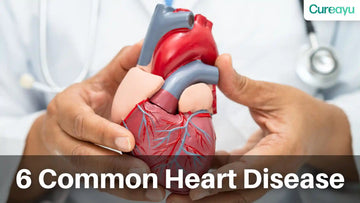The link between sufficient sleep and overall health is often discussed in general terms, but when it comes to specific risks such as heart problems, the topic demands a more intricate exploration. The nuances of how sleep—or the lack thereof—affects the heart goes beyond mere correlation and delves deep into physical manifestations that can predispose individuals to a spectrum of cardiovascular issues.
Research increasingly supports the theory that sleep is not just a time of rest but a critical period for the body's repair and regulation mechanisms, including those governing heart health. Disturbances in this restorative process, particularly chronic sleep deficiency, has been revealed as a significant risk factor for heart disease, hypertension, stroke, and other cardiovascular conditions. In this blog, we will probe into the mechanistic details and evidence surrounding the relationship between sleep and heart health, providing a comprehensive understanding of why ensuring enough quality sleep is essential for maintaining a healthy heart.
The Science of Sleep and Its Importance for Heart Health
Sleep is not merely a passive state; it is an active process critical for the body's natural healing and maintenance. Throughout various stages of sleep, from light to deep and then REM (Rapid Eye Movement) sleep, the body performs different tasks that are key for heart health. These tasks include the removal of metabolic waste from the brain, the balancing of hormones affecting stress and mood, and the repair of cells and tissues, including those in the heart and blood vessels. During sleep, heart rate and blood pressure naturally dip, giving the cardiovascular system a much-needed break from the constant demands of wakefulness. In missing out on these crucial hours of cardiac reprieve, the risk of developing coronary heart diseases and other cardiovascular events can significantly increase.
Heart Rate While Sleeping
Typically, during the tranquility of sleep, especially in the deep stages of non-REM sleep, the heart rate reaches its lowest point, conserving energy and reducing wear on the cardiovascular system. This is the body's natural way of providing daily restorative care. However, when sleep is fragmented or curtailed, this heart rate reduction is less pronounced or altogether absent. This missing downtime can be equated to running an engine continuously without ever giving it a chance to cool down. Over the long-term, the absence of this rest can precipitate various forms of heart disease, including arrhythmias, where the heart beats irregularly.
The Ripple Effect of Poor Sleep on Blood Pressure
When we are awake, our blood pressure naturally fluctuates—rising with physical exertion and stress, and falling during periods of relaxation. During sleep, this pattern should tilt towards the lower end of the spectrum, giving the blood vessels some repose. Sleep deprivation interrupts this natural dip, resulting in sustained high blood pressure during the day and night, which, if unchecked, can cause damage to the cardiovascular system over time. Think of it as a garden hose that is supposed to reduce water flow at night but continues at a high force, eventually leading to wear and tear faster than if it had the nightly pressure relief.
Inflammation and Its Cardiovascular Implications
Inadequate sleep sparks an inflammatory response because the body identifies sleep deprivation as a stressor. This heightened state of inflammation can lead to the progression of plaque buildup in arteries, known as atherosclerosis. The inflammatory markers—such as C-reactive protein—have been commonly found elevated in sleep-deprived individuals. These markers are red flags, signaling an increased risk of heart events like heart attacks and stroke, as they earmark the ongoing damage to the arterial walls, setting the stage for plaque to take hold and harden, narrowing the arterial passageway and escalating the risk of blockage.
The Relationship Between Sleep Apnea and Cardiovascular Disease
Obstructive sleep apnea presents a unique challenge in terms of heart health as it involves periodic stops and starts in breathing. Each apnea event can cause a sudden drop in blood oxygen levels, forcing the heart to work harder to circulate more oxygen-rich blood. This extra work causes an immediate increase in blood pressure and extensive strain on the heart, which over time can lead to chronic hypertension, enlargement of the heart, and heart failure. The erratic oxygen levels and increased effort by the heart throughout the night can precariously burden an already compromised cardiovascular system.
Obesity, Diabetes, and Their Intersection with Sleep Deficiency
The interconnections of sleep with both obesity and type 2 diabetes are complex but significantly present. Hormones like leptin and ghrelin, which regulate appetite, become unbalanced when sleep is short, often leading to increased hunger and appetite. Furthermore, with sleep deprivation, the body's ability to process glucose is compromised, leading to higher blood sugar levels and an increased risk of diabetes. Both obesity and diabetes carry their own associations with heart disease, creating a cascading effect of health risks originating from a common source: lack of sleep. Additionally, the lifestyle behaviors associated with inadequate sleep, such as reduced motivation for physical activity and increased cravings for high-calorie foods, further compound the issue.
Minimizing Heart Attack Risk Through Lifestyle and Dietary Measures
In the endeavor to mitigate the likelihood of a heart attack, lifestyle modification plays a pivotal role. Adjusting dietary habits, incorporating select natural supplements, and keeping a close watch on cardiovascular health markers are all integral facets of a heart-healthy lifestyle.
Embracing Natural Supplementation for Cardiovascular Support
Adding specific natural supplements can aid in bolstering heart health. One such supplement, Heart Tone Capsules, has garnered attention for its cholesterol-managing abilities. Composed of an amalgam of traditional herbs such as Arjuna, Amla, and Tulsi, to mention a few, these capsules have been recognized in Ayurvedic practice as beneficial for maintaining healthy cholesterol and triglyceride levels. The inclusion of several herbs like Giloy, Dalchini, and Garlic, also supports blood pressure regulation. Alongside lifestyle and dietary changes, taking supplements like Heart Tone Capsules could be a proactive measure in sustaining heart health and mitigating cardiovascular risks.
Nourishing the Heart with a Wholesome Diet
Optimizing your diet is crucial for heart health. Prioritizing the consumption of foods plentiful in omega-3 fatty acids, noted for their anti-inflammatory properties, and rich in antioxidants can be protective against heart disease. Complementing these dietary efforts with herbal supplements, such as the aforementioned Heart Tone Capsules, might facilitate further in managing cholesterol and blood pressure parameters.
Regular Health Checks: A Preventive Measure
Staying ahead of heart disease requires periodic health screenings to monitor vital metrics such as cholesterol levels and blood pressure. Consistent medical check-ups enable early detection of potential issues, affording the opportunity to address them before they escalate. By closely tracking these health indicators, one can decisively take measures to prevent the onset of heart-related conditions, including heart attacks.
Conclusion
The evidence is compelling: sleep is undeniably critical for maintaining optimal heart health. The intricate dance between sleep cycles and cardiovascular regulation is a testament to the complex, but unmistakable connection between a good night's rest and the prevention of heart problems. Heart rate management during sleep, alongside the broader implications of sleep on blood pressure, inflammation, and associated conditions like sleep apnea, obesity, and diabetes, underscores the holistic nature of health where sleep plays an indispensable role. Embracing healthy sleep habits isn't merely about feeling rested—it's a fundamental pillar of heart health, critical in warding off heart disease and ensuring a healthier, longer life. Recognizing and acting upon this intrinsic link is our collective stride towards a heart-healthier future.












